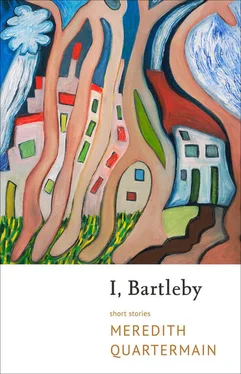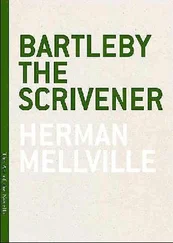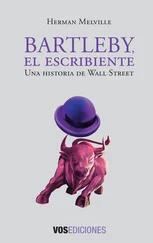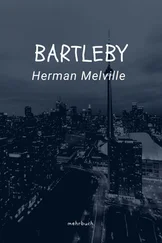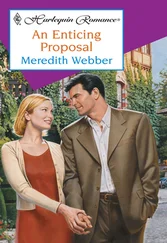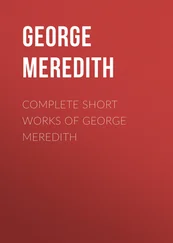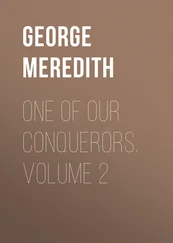light returns, seeping through cracks in curtains, even ones firmly yanked together. Above and below their bunched skirts, waves of grey grow on ceiling and floor, spinning away streams of photons to land on sleeping cheeks and eyelids. To prick the skin of a limp hand. Wake up, you corpuscles of blood. Run away through your tunnels and chutes. Tell all your friends we’re back. It’s time to jump on the bed and have a pillow fight. Time to row your boats.
Oh, I don’t know about that, say the corpuscles, Our boats are tied up, nosing the weeds of plaid kilts on the men who clean gutters much to the disappointment of crows. There goes our feeding-trough bathtub, say the crows, Get another pine cone, block up the downspout when the men in kilts take away their ladders. It’s enough to remind you of Hitchcock. Watch out. A black wing grazes a kneecap caught out between sock and pleats.
The rowing boats nose into weeds in the subcutaneous tunnels whose branchings and forkings, twigging and budding, await the corpuscles. Who now talk with particles of light, give them a slap on the shoulder. Did you see the Canucks? Five-nothing against the Canadiens. Then they blow it in the third period. Should get a new goalie. Where’s the boss? Reading… the inside of her eyelids to download a freighter of REMs into central processing. Please wait. Sixty percent complete.
The photons clear off. Bounce on glass in a wooden square, ricochet off a silver watch and the handle of a trunk made of wainscoting behind which a mongoose had lived that had puzzled, when she was a girl, the sleeping scrivener: how did a furry bird from Mongolia sneak into the wall? Did wainscoting have secret channels where the mongoose ran like a telephone signal? Or was it a friend of the girl in the story? Or something her father had put in the attic she wasn’t to know about — and if I catch you in there, you’ll be… Her brother in his diamond box — maybe he was behind the wainscoting.
She squashed her face and arms into the slats and dragged blindly along their ridges and valleys. To a small wet nose poking out of a knothole. In the central processing unit of the sleeping scrivener who thought certainly the girl was that age when she really could fly — just jump off the third step, push the air away with your arms and legs — float over chairs, tables, windowsills — on the simple buoyance of thinking. The corpuscles in their rowing boats drift back and forth moored to their kiltish weeds. Occasionally one or two detach and meander off on the current.
How does one do it, with or con — together and deception — then re-versal’s turning back? I gaze into my conversant’s eyes. Around us triads and pairs with glasses of wine — the room bursting with chatter till the walls feel their seams crack — they groan with the pressure of vocalizations, and struggle to hold fast this surging throng of speech — even thinking of themselves as a pressure cooker and hoping that whoever is boiling things up is keeping track of the flame because, if they’re not, the gauge may fly off the top and spew volcanic talkativeness into the night.
No stopping now — out it must come. I’ve been reading your book, I tell him, knowing that the same cannot be said on his part about mine, but knowing also that by telling him this I will stop his gaze, at least for a moment, from wandering over to the well-published, politically active speaker surrounded by women, near an abstract canvas of grey, pinkish grey, and bluish grey squares. Oh, out it must spew — the paper I’ve written on innovative language in poetry, and who indeed is making any claims that rearranging words in challenging conniptions thrust cruelly at readers in the way of Artaudian theatre would change the will of government to hand everything over to globalized corporations?
He helps himself to liverwurst though I’m sure he said at George’s party he was a vegetarian. Those poets only write for other poets, he says, making a pumpernickel-and-ham sandwich. Nowadays, he says, I only read to large audiences of analysts. His eye shifts to the female-adored figure against grey canvas. But somehow, I say, shouting over the din, we must live inside this monster — we have to go on — we have to have other parts of ourselves besides loathing and disgust, despair and cynicism. Must somehow see, as Olson did, humans in a universe. After all, we still must love.
Critique is love, he says between mouthfuls of mustard-coated ham. What I love I theorize. I tweak its premises, massage its syntax, arouse its rationale, I ooze into its faults, then freeze till it snaps, so everyone can finger its shards. Why would I not do that for what I love?
I who plays I collects worm food in a green bucket. I’m Green, says the bucket, which is plastic and therefore not green. My worms — do they feel owned? — live in a plastic composter — black, cone-shaped like sawdust burners at mills or coiled beehives on honey jars, though I has only ever seen bees living in stacked rectangles or old tree trunks.
This rainy day They who I calls worms crawl up inside the black shell of their beehive to air holes I has punched for bacteria and worm breath. Ones I calls They inch toward the crack of light at the edge of the lid then bumble over beehive rim in higgledy-piggledy knots and tangles unravelling to streaks of pink cursive script in some unimaginable libretto. Writing across the curving ungreen black surface, they clench, unclench, ooze mucus to stick in wriggling ropes of glistening wormskin new as baby lips.
Could there be a human version of this lazy, tangled wormflesh, this skin-melted-to-skin limb-mingled limbo, this moist, gainless breathing togetherness somewhere outside Encyclopedia World where everyone has anatomy, reproduction, taxonomy, and economic benefit — somewhere outside the unreal Reality that writes, Earthworms who eat rotting leaves in temperate forests are invasive species, but Homo sapiens who burn down forests for hamburger farms are creating wealth?
I lifts the wormhouse lid — flash of light — hail the food god — splash and thud rain down from green bucket. I pretends to be They who I calls worm, pretends They make I a god, then thinks, Not food, not god, just tube mouthing apple core, carrot peel, banana skin, radish tops, grass cuttings. I who plays I pretends to be They who I calls worm, swims through potato peels, brown leaves — not leaves, not potato — not names of anything — just writing along surfaces with myriad feet I calls bristles — mouth open, matter outside, matter inside. Tubular chew through tangles of fleshy script and trails of castings for I who plays I in whose comedy? Imagining sex between They who I calls worm, They who make black gold for I. They in naked glistening embrace, each thrusting penis into other, each enfolding, each holding out clitoris to be stroked.
Oh, I thinks, speaking in her play, how biology texts carp on about reproduction, that factory for making life units so valuable to Homo sapiens . What if I, emptying wormhouse, taking worm gold, is to They a giant wormforce, gobbling all and thrashing all to bits? I digs in fork. Pounds of clinging wriggling wormflesh fly light-blinded then world jolt upside down flat flump body daze. I, who plays I in this unserious deadly play, forks and forgets. How They I calls worms now have fork-torn bodies They may slowly regrow the way I who I calls I cannot — if only They who I calls worms are not crushed too badly.
what actors they are — what directors and stage managers and who knows they may well paint a good deal of scenery too — running their razors adroitly along the edges of moustaches and goatees. Calling out orders to a chorus of chefs whose heads and shoulders, all in black, slide back and forth behind the bar. Sometimes bumping into each other in front of an oven or while carrying a skillet of sizzling bratwurst, which, if it leaps out of the pan, could upset the waiter’s choreography of dinner for two young ladies. A blonde in low-cut black and a dark in equally low-cut sailor stripes with straps running suggestively over creamy bulges.
Читать дальше
